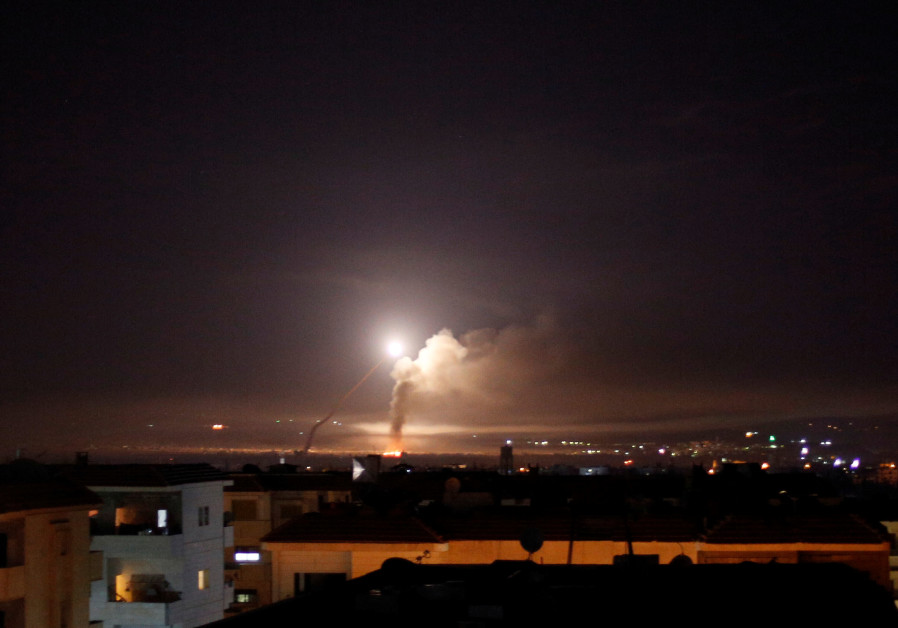Israel and Iran revert back to familiar patterns in Syria

Missile fire is seen from Damascus, Syria May 10, 2018. (photo credit: REUTERS/OMAR SANADIKI)
According to foreign media, Israeli jets on Thursday attacked a military airport located near Homs in central Syria, killing more than twenty pro-Assad regime fighters. The targeted site is believed to house Hezbollah troops—and weapons depots—along with loyalist mercenaries, and, given the close proximity to the Lebanese border, act as a hub for the transfer of arms to the Iranian proxy.
If the reports are true, it marks the most significant mission by the Israeli army since the direct confrontation with Iran on May 10, when members of the Revolutionary Guard Corps’ Quds Force launched at least twenty missiles towards Israel; this, to avenge an IDF assault a month earlier on the Tiyas, or T-4, army base that purportedly killed numerous Iranian soldiers including senior officers.
While none of the rockets hit Israeli territory (four were intercepted by the Iron Dome defense system with the others falling short of the frontier), Jerusalem responded to the bombardment by striking more than 50 Iranian targets in Syria, in what a military spokesman later described as “one of the greatest operations by the Israel Air Force in the past decade.”
In the subsequent weeks, tensions along the border have decreased significantly, and, despite reports that up to a dozen Iranians were killed in the latest attack on the Dabaa air field, there has been no response by Tehran. This suggests that Israel has, to some degree, deterred the Islamic Republic, which presently appears lacking in conventional military capability sufficient to harm the Jewish state.
Notably, Iran also is currently entangled in the fall-out from Washington’s withdrawal from the nuclear deal and may thus be conscientiously trying to limit its exposure by laying low in Syria.
This confluence of factors raises the prospect of the two sides reverting back to a familiar pattern, at least for the time being; that is, Tehran will continue its effort to establish a permanent military foothold in Syria, and swallow its pride when Israel attempts to thwart this potentiality by striking Iranian assets intermittently.
The problem with such a dynamic is that it is inherently unstable and unlikely over the long-run to result in any desirable end-state equilibrium.
The question, then, is in which direction the scale is liable to tip in the short-term.
“I think it is too early to answer,” Michael Herzog, a retired Israeli brigadier general and currently an International Fellow at the Washington Institute for Near East Policy, conveyed to The Media Line. “Obviously, Israel and Iran have been on a collision course in Syria due to Tehran’s push to transform the arena into a military front. But to determine the answer, it will take more than one round [of fighting] to see where things stand.
“Iran has suffered a blow and is probably learning its lessons and deciding what course of action to take. And it may be that such will not originate from Syria,” Herzog concluded. “For Israel, the need is to stop the Iranian entrenchment and, in this respect, more time is needed to assess. Iran still has significant military deployments there, so it is not over.”
Dr. Avi Davidi, former Iran Director at the Israeli Ministry of Strategic Affairs, believes that the outcome of the Jerusalem-Tehran stand-off in Syria may not even be determined by either party. “I don’t think that Israeli actions will deter Iran, as the targeting of assets only slows down the [military] build-up without fundamentally changing the Iranian desire to be present in Syria,” he contended to The Media Line. “In the end, this comes down to how [Russian President Vladimir] Putin acts and whether he is willing to reign in Iran.
“Last week, he said that all foreign powers would start to leave Syria and then a Kremlin spokesman appeared to clarify that this includes Iranian and Hezbollah forces. It is possible that Israeli strikes and most probably US support might have convinced Putin that it is in his interest to satisfy Jerusalem’s demand.”
Within this context, it is noteworthy that Israel’s recent major retaliatory strikes against Iranian resources coincided with a visit to Moscow by Prime Minister Benjamin Netanyahu, who has gone to great lengths to coordinate as best as possible military operations with Russia through a so-called de-confliction mechanism in Syria. But there is only so much that Putin can do to prevent flare-ups so long as Israel retains freedom of action over Syria’s skies. And as the Russian leader seems unwilling, or unable, to stop the IDF from upholding its red lines vis-à-vis Tehran, it may be that the stability he seeks as the war winds down can only be achieved by applying pressure on the Islamic Republic to forego its ambitions in Syria.
Given Iran’s massive investment in the Assad regime, coupled with its broader geopolitical goal of cementing a contiguous land bridge from Tehran to the Mediterranean Sea, this will, undoubtedly, be no easy feat.
Hence, as Prime Minister Netanyahu said somewhat presciently Sunday in reference to Israel’s campaign against Iran in Syria, “we are still in it.”





Comments are closed.